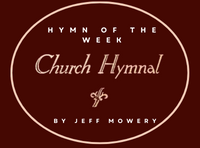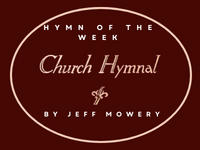Pass Me Not, O Gentle Savior
Pass me not, O gentle Savior,
Hear my humble cry;
While on others Thou art calling,
Do not pass me by.
Chorus
Savior, Savior,
Hear my humble cry;
While on others Thou art calling,
Do not pass me by.
Let me at Thy throne of mercy
Find a sweet relief,
Kneeling there in deep contrition;
Help my unbelief.
Trusting only in Thy merit,
Would I seek Thy face;
Heal my wounded, broken spirit,
Save me by Thy grace.
Thou the Spring of all my comfort,
More than life to me,
Whom have I on earth beside Thee?
Whom in Heav’n but Thee?
Written by the great hymnwriter, Fanny Crosby, I was reminded of this hymn during a recent His Hands Extended devotion. According to my research, Fanny Crosby wrote this song after reflecting on her visit to a prison. Because of her fame, she would often be invited to missions services. On one occasions, she participated in a missions service in a prison. She recalls hearing men through the prison bars crying out saying “Lord, do not pass my by.” She was so moved by this experience that she wrote this song and was quoted as saying “I wrote the lines with the men’s pleading wail still in my ears.”
I have always loved this song and really intrigued by the story behind it, but I will tell you it is one of those hymns whose words are challenging for me, theologically speaking. The fundamental issue I have with this song is the prayer that the Lord not “pass me by.” Isn’t God the God of the “whosoever will?” Isn’t He the God who stands at the door knocking and if any man opens the door, He will go in? I believe that He is. But I also know, that there are times when God chooses certain people at certain times and certain places. He passes some by and chooses others. For example, when Samuel was seeking God direction for Saul’s replacement, God told Samuel to pass by all of Jesse’s other sons. “Not him. Not him. Not him.” And then he asked if he had any others, and finally God chose David. God did not choose Jacob’s older sons to eventually deliver His people from famine in the land. He chose Joseph. He passed by Reuben, Simeon, Levi and Judah and others before He chose Joseph to do His will.
I think this is an example of the struggle we sometimes experience with the doctrine of free will and election. Between the sovereignty of God and man’s will to choose. Greater minds than mine have written, debated, argued, and unfortunately became divisive over this topic. So I will not try to defend or debate or to be divisive. I am not that smart. But I will say this. There are verses like Exodus 33:19 where God is speaking and He says “I will make all My goodness pass before you, and I will proclaim the name of the LORD before you. I will be gracious to whom I will be gracious, and I will have compassion on whom I will have compassion.” Or verses like Deut. 7:6 where the Bible says “For you are a holy people to the LORD your God; the LORD your God has chosen you to be a people for Himself, a special treasure above all the peoples on the face of the earth.” Or verses like John 15:16 when Jesus says “You did not choose me, but I chose you and appointed you so that you might go and bear fruit—fruit that will last” Then on the flip side, we hear Jesus say “whosoever” dozens of times in the Gospel. And we hear Him say, “if any man…” He makes an open invitation to all.
I therefore am left with this thought. I know that Jesus is calling today.
“Earnestly, tenderly Jesus is calling. Calling O sinner come home.” And I know that God is choosing. Choosing and gifting those as He sees fit. My prayer, is like Fanny Crosby’s – “Pass me not.” Don’t pass me by, but let me be chosen and used by You for Your pleasure. I know that Fanny’s prayer was answered, and I pray that God will hear and answer that same prayer for me.
Couple of comments on the lyrics:
- Kneeling there in deep contrition – Contrition is not a word we use or experience much. Dictionary.com seemed to have a good handle on this word. It defines contrition as “sincere penitence or remorse” and “sorrow for and detestation of sin with a true purpose of amendment, arising from a love of God.” Wow! Isn’t that what true repentance is? A spirit of humility (kneeling). In deep contrition (sincere remorse) for our sins and for what we have done against God. What a powerful picture!
- Help my unbelief – This phrase is a reference to Mark Chapter 9 where a man is asking Jesus to heal his son who is possessed with an unclean spirit. Jesus tells him “Everything is possible for one who believes.” The boy’s father replies “I do believe. Lord help me overcome my unbelief.” Isn’t that us sometimes? Do we believe the Lord will provide? Do we believe the Lord will heal? Do we believe the Lord will save? The answer to all of those questions is “Yes.” But we are many times like this father. One who believes but is also influenced by depth of a problem, by the gravity of a situation, or by the severity of the pain. Our prayer should be “Help my unbelief.” I really like this story in Mark 9 because Jesus heard the prayer of a desperate father who believed, and who still had some unbelief. Jesus healed the boy from this unclean spirit and answered the prayer of this father (who I am more like than I would prefer to admit).
- Thou the Spring of all my comfort – Although I have never lived near or relied on spring water, I am familiar with these kinds of springs. Springs are interesting. They are consistently, gently flowing. They don’t dry up. They provide a cool, steady flow of water. Isn’t that how God and His comfort are? It is cool and refreshing. He is consistent. Paul reminds us in 2 Cor 1:3-5 “Praise be to the God and Father of our Lord Jesus Christ, the Father of compassion and the God of all comfort, who comforts us in all our troubles, so that we can comfort those in any trouble with the comfort we ourselves receive from God. For just as we share abundantly in the sufferings of Christ, so also our comfort abounds through Christ.” I love how Paul marries Comfort with God and with the words “all, any, trouble, and abounds.”
In past “Hymns of the week” I have talked about the deep theology found in traffic and road signs. You may recall signs like “One way” “Wrong turn” or “No U Turns” are examples that can have deep spiritual meaning. Well this week’s hymn also reminded me of a road sign. The one that reads “NO PASSING ZONE.” Do you know where the “NO PASSING ZONE” is spiritually speaking? It is in the place of humility and prayer. The place of deep contrition. The place where we have been emptied and are ready to be used by the Lord. When we are in that zone, He will not pass us by. The Bible tells us that in Psalm 51:17 that “the broken and contrite spirit, O God, thou will not despise.” He will not cast us out. He will not pass us by. I am grateful today that there is a “NO PASSING ZONE” and that we can, with confidence, know that God will not pass us by.

